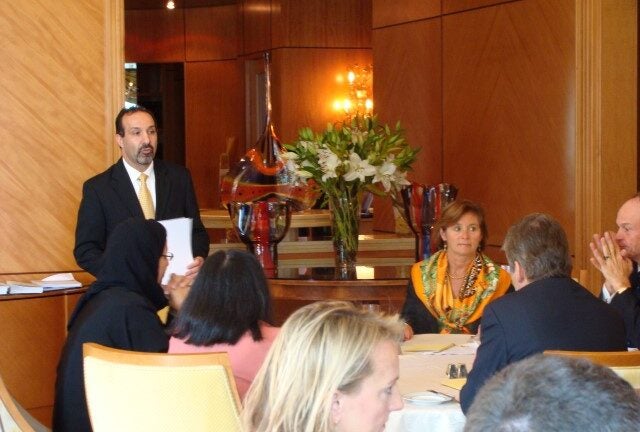American Studies, Dialogue Series, Regional Studies
American Public Diplomacy after the Bush Administration

CIRS hosted a luncheon discussion on October 19, 2008, featuring Cynthia Schneider, Distinguished Professor in the Practice of Diplomacy at Georgetown University, nonresident Fellow at the Brookings institution, and former U.S. Ambassador to the Netherlands. Professor Schneider discussed ways in which the next U.S. administration should use culture as part of its diplomatic efforts. The lunch was attended by a number of locally-based ambassadors, policy-makers, and educational experts from Qatar Foundation and the Brookings Institution.
Schneider began her talk by quoting author Fareed Zakaria, saying that “America remains the universal nation, a country that people across the world believe should speak for universal values”. This, she said, summed up the current situation in which the U.S. has seriously squandered its world-wide reputation as a country that stands for universal values. The U.S. does however, have the potential to fix its image abroad through the healing and generative aspects of its art and culture.
Throughout her career as both an art historian and a diplomat, Schneider said that she attempted to successfully combine public diplomacy with cross-cultural understanding. Her aim, she said, was to promote U.S. culture as a major component of foreign policy; not in the sense of “selling” U.S. culture to the rest of the world, but by offering it as a friendly gesture in order to enhance “mutual understanding and respect” with other nations. Schneider reported that one of the most striking results of John Esposito and Dalia Mogahed’s Gallup poll research was that the issue of “lack of respect and understanding on the part of the U.S.” rated higher on the agenda in the Arab world than the Israel/Palestine conflict or the war in Iraq. This shows how important it is for the next U.S. administration to conduct culturally sensitive diplomatic missions that try to understand the realities of the Arab world in order to not misrepresent the problems it faces in these regions.
In order to fully integrate cultural promotion with foreign policy, Schneider quoted the basic principles of public diplomacy, which are to communicate some aspect of U.S. values such as diversity, opportunity, or freedom of expression; to cater to the needs of other countries and to recognize that the same formula does not work for everyone; and to enter into a long-term relationship with other countries. She explained that “military power has limited value and can’t solve all, or many, problems” and that we have witnessed the damage that the excessive use of force has done. This is why it is necessary for the next U.S. administration to find alternative means of engaging with the rest of the world. Listening, she said, was an integral part of reciprocal public diplomacy and one that, in its simplicity, generates a great deal of respect for the other.
The media, both commercial and state-owned, is a powerful tool for promoting values internationally and should be used to enhance positive cross-cultural relationships. Popular culture is an important means of promoting values, history and heritage. Specifically, more positive representations of Arabs in U.S. media and entertainment programs can go a long way to bettering relationships between the U.S. and the Arab world.
In conclusion, Schneider made three recommendations to the next U.S. administration that would significantly improve its diplomatic efforts in the Arab world. These included aligning values and actions; engaging and not instructing; and taking other nation’s cultures as seriously as they do.
Article by Suzi Mirgani, CIRS Publications Coordinator.